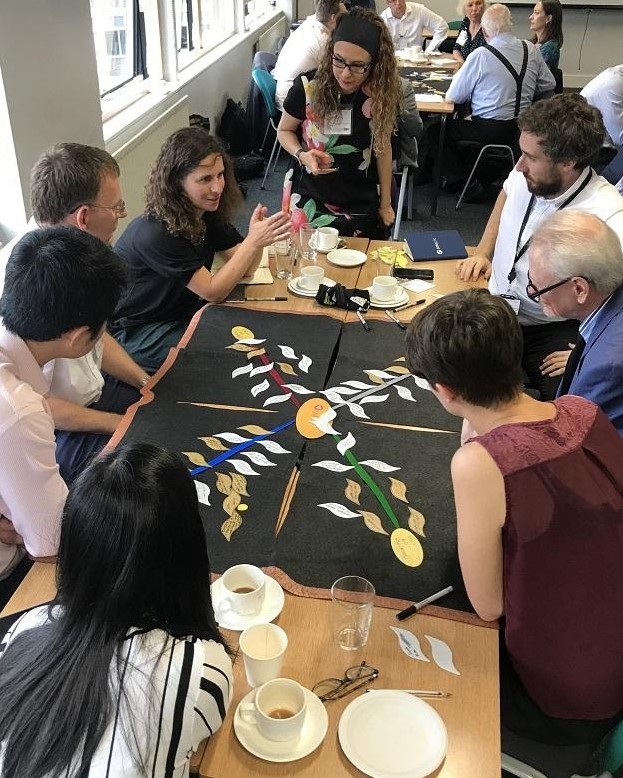Bringing stakeholders from across industry, government and academia to understand the potential of Heating as a Service (HaaS) as an energy delivery model. The “Heat as a Service: Understanding evidence needs and research gaps” project aimed to explore the evidence needs of key stakeholders around the impacts of, and barriers to, offering heat as a service.
The “Heat as a Service: Understanding evidence needs and research gaps” project aimed to explore the evidence needs of key stakeholders around the impacts of, and barriers to, offering heat as a service. The workshop described below contributed to the Active Building Centre research on zero carbon domestic heating for smart homes/buildings, and was funded by the UK Energy Research Centre (UKERC).
Here Dr Zoya Pourmirza, the PI for this project, discusses a collaborative workshop which was organised to facilitate face-to-face networking and knowledge-sharing between stakeholders and help them network with other research organisations. For more information you can access the Heat as a Service workshop report here.
This article was originally published in October 2019 here.
The need to accelerate the decarbonisation of heating, as well as the rise of the ‘smart home’, mean that there is an increasing focus on the role of innovative consumer offerings in driving the shift to zero carbon domestic heating. In the context of these agendas, Heat as a Service (HaaS) models which provide customers with an agreed heating plan, rather than simply providing units of fuel are receiving increased attention, and are perceived as having potential to support a step change in the rate of heat decarbonisation.
Project aims
The aim of this project is to explore the evidence needs of key stakeholders around the impacts of, and barriers to, offering heat as a service. Accordingly, we organised a workshop on 16th September in London, to facilitate face-to-face networking and knowledge-sharing between stakeholders, and help them network with other research organisations. We gathered 40 participants from academic, industry, civil society, and government sectors to discuss Heat as a Service and its potential as an energy delivery model.
Workshop – viability of HaaS models & the data
The workshop was divided into three sessions. In the first session we had speakers from Energy System Catapult, Bristol Energy, Citizens Advice, UKERC Heat Network, and EPSRC, discussing the smart system heat programme, the trial experience, consumer issues, and providing an overview of UKRI’s heat decarbonisation priorities.
Questions raised in this session were mainly in relation to the viability of HaaS models for different customer segments, data collection and data interoperability issues and the role of policy in making HaaS models commercial. Speakers responded by saying these are key challenge and the ESC and Bristol Energy are considering this in their ongoing work.
The second session was a facilitated discussion session. Participants were divided into groups, focusing on what work is already happening in relation to HaaS, and what are the ambitions and opportunities for HaaS? What are the barriers and knowledge gap? And how might we overcome the barriers and knowledge gap identified in the earlier discussions?
In relation to the HaaS models for different customer segments, it was highlighted that granular segmentation of customer types is very important, as is a close relationship with each customer to ensure information provision and choice is clear. There seems to be an underlying trust issue between customers and energy providers and HaaS can help overcome that.
Proposing ideas
The third session was a Dragon’s Den activity, in which participants worked in groups to develop their ideas about a new HaaS research project. They were asked to develop a 1-minute ‘elevator pitch’ describing their proposed project, and then voted on their favourite project developed by other groups using bundles of imitation money.
In relation to the role of policy in making HaaS models commercial, the answer was: modelling risks across consumer propositions is challenging and varies widely depending on the segmentation of customer groups. There are challenges relating to tenure, length of contract, asset ownership, data/money flows and policy needs to recognise the need for both consumer and asset protection measures.
Conclusions
To conclude, we have identified a number of challenges and opportunities for HaaS. We have also considered if Heat as a Service is a viable solution to decarbonise heat in the UK. Some of these challenges include lack of proven market, lack of skills and capacity, lack of finance for transition to enabling technology, and finally lack of strong policy. We will shortly release a report detailing the current state of knowledge and research gaps.
Dr Zoya Pourmirza is a researcher at Newcastle University and is supporting the Active Building Centre Research Programme to develop a programme wide understanding of the scale up impact and trajectory of the Active Building approach.


